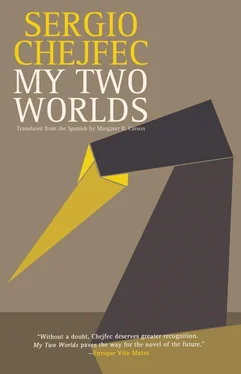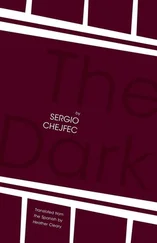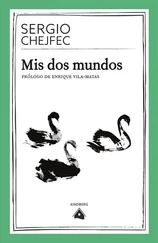In order to go out on the dock and board a swan, you had to pay a rental fee at a narrow cement ticket booth with a Spanish-tile roof, a little like a chalet-style guardhouse. A sign atop it said PEDALINHOS and listed the prices for weekdays, weekends or holidays. The minimal rental was fifteen minutes, which may give the wrong idea about the true dimensions of the lake, since whoever wanted to go to the far end would need a good deal more time. It seemed unlikely to me that the swans were capable of getting up much speed, and a little later, when I saw one in action, I confirmed their slowness. The planking that doubled as a dock had pipe handrails painted green. To the left of it, more difficult to access by water — on foot you’d have to cross a narrow and perhaps risky plank — were moored other, more conventional boats, resembling open cars, which were clearly old, less graceful, and out of use for some time.
The lake is in the form of an elongated ellipse, and the pedalinho station stands just past the midpoint of one of its longer arcs. I could have easily circled the lake, following the path that paralleled the shore just a few meters from the water, but for some reason that I cannot now recall, maybe because I simply thought it was getting too late, who knows why, in the end I didn’t. For almost its entirety the lake is surrounded by a strip of marshy land, low brush, and wild thickets. The pedalinho area stands next to an open plaza separated from the lake by still more plant life, through which one sees only intermittent reflections from the water, as if the lake were a mere intuition or belonged to a strange land.
The plaza next to the swans has as its epicenter a singularly beautiful Rationalist terrace, where there rises a structure that resembles a spinning top, with concentric circular platforms of uneven size, its Constructivist style similar to that of the small guardhouses described earlier, and painted the same antique yellow. I remember that the name of the architect, whose surname was German, appeared on one of the side walls of the circular structure. I walked around the small plaza, from which one could see the pedalinhos gleaming in the sun, especially their curves, that is, their flanks and their necks. I couldn’t imagine the spot crowded with families or young people on a Saturday or Sunday, since it now seemed definitively overcome by solitude. At the entrance I’d seen the swan attendant, dressed in a shirt that was blue or sky-blue, and an ice cream vendor in a yellow-trimmed red uniform, who had left his cart standing in the middle of the path a few meters away. Both stood leaning against one of the short columns that guarded access to the plaza. Every so often the boat attendant would turn to check on the swans; a reflex action, no doubt, since he could be sure no one was around. Or perhaps he, too, also intuited the presence of a flickering or secret life in them and, prompted by this suspicion, kept a close watch.
At times a solitary walker, like myself, appeared on the path, or one with children, or perhaps a couple, whatever; but whichever it was, whether a regular or a first-time visitor, everyone walked around this section of the park as if gone astray, or on the whole with the slow step of someone groping his or her way through unsafe or unfamiliar terrain. Conceivably it was the deep shade, contrasting with the luminous reflections from the lake, that gave the area a cave-like air, the air of a place given over to secrets and surprises. .
The attendant and the ice cream vendor kept at it, bonded, so to speak, by the advancing afternoon. They amused each other with an occasional exchange of brief, languid remarks, subsiding afterward into a long silence until their banter resumed. I was able to observe them very well when I sat down on the steps of the terrace to enjoy the tranquility of the place. They were wholly oblivious of me, it’s even possible they never saw me, because I remember that as I passed by them I believed myself to be invisible, to the point of feeling a bit uncomfortable, since in such silence and solitude one doesn’t expect to be ignored as if one didn’t exist. In fact, I assumed, as is my habit, that under those circumstances a greeting was essential, and I half-sketched a wave as I walked through the entrance quite close to both of them, or I believe I did. But it was as if the wind had passed by. I won’t deny I felt slightly mortified, if only fleetingly, since I’d forgotten all about it a moment later.
I’d like to know just when my need to greet others originated; there must have been a first time, because it wasn’t always like this: I used to greet people just enough, in accordance with established conventions. Now for the most part I believe I still do a good job at it, though at times an imbalance arises. I venture a greeting, or am about to do so, then realize it’s not reciprocated. The urge is irrepressible, and inconvenient too, because there’s nothing more distracting than greeting someone, yet it’s stronger than I am. I don’t know what happens to other people, but in my case I think I know the cause: an uncontrollable mimetic urge impels me to greet. It’s not that I want to be taken for a native, which would be impossible anywhere, but that I simply seek to be regarded as normal. I have an extremely basic idea of normality, related solely to what’s superficial. But since for foreigners, what’s superficial is always what’s most visible, a greeting is the price you pay for wanting to be normal.
The ice cream vendor and the attendant weren’t obliged to be normal, while I’m obliged to act it. I’m required to act normal, I repeat, in any place, including my own country. That’s why what I described earlier happened, as I was diligently scrutinizing my map in the middle of the sidewalk, and all my doubts and worries briefly disappeared when I believed the street vendor was waving to me from the gutter, alongside the passing traffic. I returned his greeting and began walking toward him. And as I said, I felt tremendously embarrassed when I realized he was hailing another person to ask for help. Partly because of it, I turned my eyes back to the map, as if I were hiding, and kept on trying to make sense of it. I now replayed those events and was under the impression I’d undergone them a good while ago, not merely a few hours earlier; and furthermore, I was under the impression I’d experienced them in another situation, in another time scheme, and under other conditions. I don’t know whether this may have been an effect of the park — most likely it was. Parks and long walks separate me from time and install me in a different dimension, an alternate one, obviously compatible with the true one, shall we say, or in any case with the regular one, isolated and at times autonomous as it may be.
For instance, from a certain distance I took part in the predictable development of that muted conversation between the two men, the swan attendant and the ice cream vendor, and despite there being nothing in their dialogue that in the least concerned me or aroused my curiosity, I recognized in the scene an essential act, a privileged and moving event which I was flattered, even proud, to have witnessed. It might sound a bit presumptuous, but that’s how it was. Somewhat like my reaction to the landscape the ground often presents. It was a simple or forgettable conversation, a way of killing time; perhaps it wasn’t a conversation at all, but for me it had a transcendent quality. I thought: the park, the harmonized light and shade, the lake, the manufactured nature, the world in miniature, the imitation of fauna, etc., and on top of that, the communication, whose possible simulation I had no reason to rule out, between two individuals. Never before had a dialogue seemed so essential to me. I don’t mean that in dramatic terms, as something essential to resolving a conflict or a mystery, but rather in terms of its human significance, I don’t know what to call it, metaphysical might perhaps be too much. .
Читать дальше












